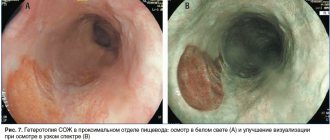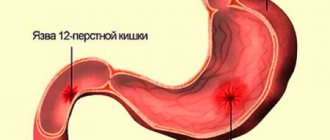11/19/2018 · Pro Psychosomatics · Comments: ·
Typically, ulcers are chronic and last for years. You may be able to treat your symptoms periodically, but after a while they may flare up again. Because there are reasons for these exacerbations. Most often, they lie in the psyche. We will talk about this, how the psychosomatics of stomach and duodenal ulcers arises. Let us use our psychological experience to clarify why this happens and give specific recommendations on what to do to reduce the influence of your negative emotions on these organs.
Some clients experience symptoms all the time, while others have symptoms that come and go. But some of the most common symptoms are:
- nausea and vomiting,
- flatulence and bloating,
- belching and heartburn,
- painful sensations.
Diseases have internal psychological causes (psychosomatic) and physiological ones, such as heredity, high acidity, the presence of bacteria in the body that can cause ulcers, poor diet, bad habits (smoking and alcohol), and constant use of medications.
What are the causes of psychosomatic gastric and duodenal ulcers?
Very often, many gastrointestinal diseases are associated precisely with a person’s social realization. Since people experience stress during career advancement and when starting their own business, all this is reflected in the body.
The duodenum and stomach, for example, manifest themselves in such a way that under stress, the nutrition of their walls is disrupted, which leads to corresponding symptoms.
Why is this happening?
Some theories explain this by saying that during times of stress, corticosteroid hormones are released. And, since this release is prolonged, their excess eventually disrupts the production of mucus.
It was the mucous membrane that protected the intestines and stomach from the influence of acids. And with a lack of this mucus, the organs become defenseless.
But the underlying cause is stress. And the situations that provoke it most often have the character of social realization.
Such a person often experiences a feeling of uncertainty, is constantly in a state of choice, a state of competition.
All this begins to cause emotions of anxiety, fear of the future, which he cannot cope with. And the body reacts to these emotions by releasing the corresponding hormones, which affect, among other things, the stomach and duodenum.
And not only on them. It is worth noting that most often, along with these diseases, a whole bunch of diseases of other organs “come”, since they are all closely related to each other. So, over time, some experience problems with the pancreas and liver (read about the psychosomatics of liver disease here).
Thus, the basic emotion in psychosomatics in most cases is fear.
During stress, this may be a fear of rejection (that loved ones will not accept and will not love for who they are). By the way, such fear often underlies neurotic success (when results are put at the forefront, and the activity itself is not important). Such clients are usually trying to prove to their parents that they are worthy of love. But this is proven not by grades, but by achievements.
Such fears are very often associated with parent-child relationships, with a feeling of being unloved, with a feeling of humiliation (and a reciprocal desire to become super-strong). Various psychotraumas are possible here.
Psychosomatics of stomach and duodenal ulcers
Manifestation: disorder of the secretory and motor functions of the stomach and duodenum. Inadequate chewing of food, haste in eating, swallowing air, excess and unwise food choices are all expressions of emotional conflict and neurosis. The desire to “eat up” stress.
Low acidity often occurs during periods of depression and due to overwork.
Parents: emotionally cold, distant mother or father. Either rejecting or overly pampering parents.
Psychogenic factor: men are at risk. The desire for security and the desire to receive, to be loved, to rely on someone are psychologically connected with aspects of eating.
Internal conflict: the desire for dependence contradicts the desire for independence and self-affirmation. The desire to remain in a situation of infantile dependence, i.e. to be loved and cared for, to be in conflict with pride and with the desire for independence, achievement and self-sufficiency. And then the desire to be loved turns into the desire to be fed. As a rule, self-esteem is low and self-respect suffers. Outwardly, many ulcer patients are very aggressive, ambitious and independent. They do not like to accept help and overload themselves with all sorts of responsibilities; this type is often found among successful businessmen and careerists. Functional gastric disorders are caused by anxiety, fear, family quarrels and failures at work. There is a great need for rest, safety and help, therefore, on vacation, symptoms often go away on their own or weaken due to relaxation, a change in environment and release from emotionally difficult life or work situations.
Gastric symptoms as indicators of personality disorders and negative environment. Therefore, it is important to pay attention to the secondary benefits of the disease, as a rule, this is the desire to rest, which one does not allow oneself to do.
Ulcers are diseases of the civilized world, affecting people of Western civilization who live by aspirations and ambitions. Rigidity and rigidity in character. The Eastern races and American Indians do not have this disease. Typically, such patients can afford rest only if the symptoms become severe or threatening or after acute bleeding, then only “they can rest.” Often such people achieve “success based on the trauma of being rejected.” A person strives to win the recognition of his parents by achieving success in his studies and then in his activities.
According to Liz Burbo, all stomach diseases are directly related to the inability to accept a certain person, usually a loved one, or situation. A person experiences hostility and even fear towards something that is not “to his taste”. He resists new ideas and has difficulty adapting to a person or situation that does not fit with his plans, habits, or lifestyle. Such a person has a highly developed inner critic, which prevents him from listening to the voice of his heart.
This is in very general terms. Much, of course, is revealed in personal work with a psychologist.
How to help yourself:
- Allow yourself rest and irresponsibility. Allow others to love you for nothing. Let go of control. Try to listen to other people's opinions. Trust others.
- Give yourself 1 day a week to “do nothing” and notice how you feel about being idle.
- Autotraining. Meditations. Yoga classes.
- Accept all people as they are. Give yourself and others the right to make mistakes.
Psychological causes of stomach ulcers
As for career advancement, if this does not happen, then a person ceases to feel safe. Sometimes he has self-criticism that he does not live up to the image he strives for.
This happens because you want more and faster, but in life results do not appear so quickly.
Self-criticism begins. This is where our body comes into play. Some authors believe that the psychosomatics of stomach ulcers is a direct consequence of self-criticism (“a person eats himself”).
Therefore, the desire to conquer new heights is associated with stress, fears and anxieties. (Read about how to cope with stress here).
There is a feeling of inferiority, constant dissatisfaction with your results and their devaluation.
Yes, even elementary envy, if it continues for a long time, can lead to self-criticism.
The desire to show one's superiority and other moments of self-realization - all this affects stomach and duodenal ulcers.
Psychological reasons always signal that you need to learn to cope with emotions.
That is, you don’t have to give up your dream, but if you continue to move towards it in such an energy-intensive way, you can spend your resources very quickly.
How to cope with the psychosomatics of an ulcer
We have one recipe. It is always worth starting work in two directions at the same time.
Firstly , consult a doctor, undergo a full investigation, identify all the causes and factors that you can influence.
For example, alcohol and smoking are obvious factors that provoke the disease, and a duodenal ulcer is an excellent reason to give up these addictions.
In addition, the doctor will help instantly reduce the symptoms and manifestations of the disease in the body. That is, you will get relief in the near future.
You will get relief, but getting rid of a chronic disease will occur when the level of stress hormones decreases and does not provoke more and more exacerbations.
This will happen by working on your emotions. You can work with them yourself, or you can with the help of a psychologist, which will help save time.
With social realization, a person strives to reach new heights, it is important for him to prove something, not to fall in the face, it is important to become a beacon for his relatives and friends.
And everything would be fine, but at the same time it is important to maintain a positive attitude and fully accept the possibility of defeat. Which are inevitable. And many are unable to come to terms with possible failure in advance, which is why they experience anxiety.
It is necessary to accept these moments and work through your fears, which are different in each specific case. Then the psychosomatics of the stomach and duodenal ulcer will gradually fade away until complete recovery.
Some experts see the solution in accepting the situation and any result.
For example, Sinelnikov characterizes a gastrointestinal patient as an anxious, irritable and restless person. And the famous Louise Hay writes about an ulcer that it is a clot of obsessive and disturbing thoughts about one’s own inferiority.
So it turns out that ambition and constant striving without internal psychological study are a source of stress and illness in the body! General techniques also work. But this path is longer.
One of the effective methods for working with psychosomatics is the elementary technique of forgiveness (we wrote about it in the article on how to work through grievances against parents). As a result of this technique, over time you will be able to cope with anger towards loved ones and your significant other.
3. Symptoms and diagnosis
Clinical manifestations of peptic ulcer disease vary widely. The most typical symptoms include:
- pain syndrome (in turn, very diverse depending on individual characteristics, food intake, acidity level, etc.);
- dyspepsia, dyskinesia (reflux syndrome, belching, nausea and/or vomiting, flatulence, diarrhea, constipation);
- an admixture of dark blood and/or mucus in the stool, and in case of severe gastric hemorrhage - in the vomit;
- changes in the mental state and appearance caused by improper metabolism (asthenic syndrome, depressive-hypochondriacal disorders, tendency to lose weight, deterioration of the condition of the skin, hair and nails).
In cases of perforation of ulcerated walls, the contents of the stomach end up in the abdominal cavity; the patient, as a rule, experiences dagger pain and assumes a forced fetal position. With almost one hundred percent probability, deadly diffuse peritonitis develops.
Very severe complications of peptic ulcer disease are also gastric bleeding, pancreatitis, cholecystitis, deforming fibrous scarring, malignancy of the process, fatty hepatosis.
The diagnosis should be based on the results of a comprehensive objective examination (complaints, clinical examination and history are not sufficient in this regard). Before the advent and widespread introduction of endoscopic technology, the main diagnostic methods for a long time remained radiography (which, in contrast modifications, still remains important to this day) and probing (for the purpose of sampling gastric juice for measuring pH and other tests). Today, gastroenterology has a wide selection of informative and reliable methods, both instrumental (ultrasound, CT, MRI) and laboratory (biopsy, biochemical and bacteriological tests, standard clinical tests of blood, urine, feces, etc. - according to indications) . However, the most informative method, which allows not only to visualize problem areas with an accurate assessment of their condition, but also to carry out a number of microsurgical manipulations “on the spot”, is FGDS, or fibrogastroduodenoscopy - for modern gastroenterology this is truly the “gold standard”, the refusal of which ( under any subjective pretext), diplomatically speaking, unreasonable.
About our clinic Chistye Prudy metro station Medintercom page!
Our effective method for dealing with fear of ulcers
As specialists, we approach our work from different angles. You can adjust an emotion you're already experiencing, but you can go even deeper.
When are you not afraid?
Then when you do what you like, what you should, but are not sure of the end result.
Many of our clients engage in activities simply because they generate income. But there is no joy from her. Only money. And for the sake of money, many make deals with their conscience (especially when they have loans and other payments). If only there was more money. This is a neurotic state.
If a person has found himself and does what he loves, he is not afraid. This is why self-realization is so important. Self-realization is not only about money, but also about the feeling that your path is correct, the feeling that you are doing what you love. And you can always turn this business into a source of income. Now there are all the possibilities for this: both a personal brand and remote work.
Feeling that you are on the right path helps you cope with past fears very well. And often the psychosomatics of stomach and duodenal ulcers go away and no longer worsen if a person follows this recommendation.
4.Treatment
It is impossible to list all the options for the development of peptic ulcer disease and, accordingly, the treatment prescribed in different cases - they depend on many clinical and individual factors. In the most difficult situations, the method of choice is surgery, which sometimes has to be performed according to an emergency or emergency protocol. In other cases, normalization of all factors and conditions related to lifestyle, diet and mental state becomes key. A large role is given to sanatorium-resort treatment, in particular, at the sources of the most effective mineral waters for a given patient.
In terms of drug treatment, the most commonly prescribed are antacid and antibacterial agents, anti-inflammatory drugs, regulators of metabolism and neurohumoral balance, and according to indications - analgesics, herbal medicine, etc.
The prognosis is favorable provided that treatment is started in a timely manner and the patient complies with all instructions received from the doctor, including a preventive regimen, regular anti-relapse measures, and long-term clinical monitoring.
How to cope with psychosomatics faster
Watch the video from our psychologist with more than 20 years of experience, Olga Kopylova. In it she talks about how psychosomatics is formed:
Two points are important: getting to the exact cause and choosing the right psychological techniques. If you break down all the work into stages, then it would be more advisable to go this way:
- determine the initial situation,
- specify the root emotion (anger, guilt, shame, grief - each has its own),
- select appropriate psychological techniques,
- check the correctness of their implementation,
- adjust the emotion (develop new reactions to provocations).
Moreover, you can take the first step to find the cause today. To do this, take our test:
Take the test
Example : you can read for a long time about constipation - that these are mental blocks, dislike for yourself. But in 95% of cases it appears in a state of choice, in limbo. If you have basic mistrust and anxiety, constipation becomes chronic and worsens during the period of choice.
Consequently, situations with choice will never end, but the attitude towards them can be changed using psychotherapeutic methods.
What do the majority do?
They study the theory, but do not achieve improvement.
The fact is that working independently with your unconscious requires a lot of preparation.
Do you need a specialist?
It will just be faster with him. It’s possible to cope on your own, but only a few can do it and it takes a long time.
In our practice, the terms varied from 1 consultation to a year. Quite common cases are:
- hemorrhoids in women,
- a sore throat,
- herpes,
- lungs (for example, bronchitis),
- various allergies,
- childhood illnesses through parents and others.
You can find out about working with us here. Moreover, the psychosomatics of stomach and duodenal ulcers are quite amenable to correction, which will lead to a reduction in unpleasant sensations. I wish you health and psychological comfort.
Discussion: there is 1 comment
- Alexander:
September 1, 2022 at 11:18 amPsychosomatics of the stomach and duodenum.
Answer








